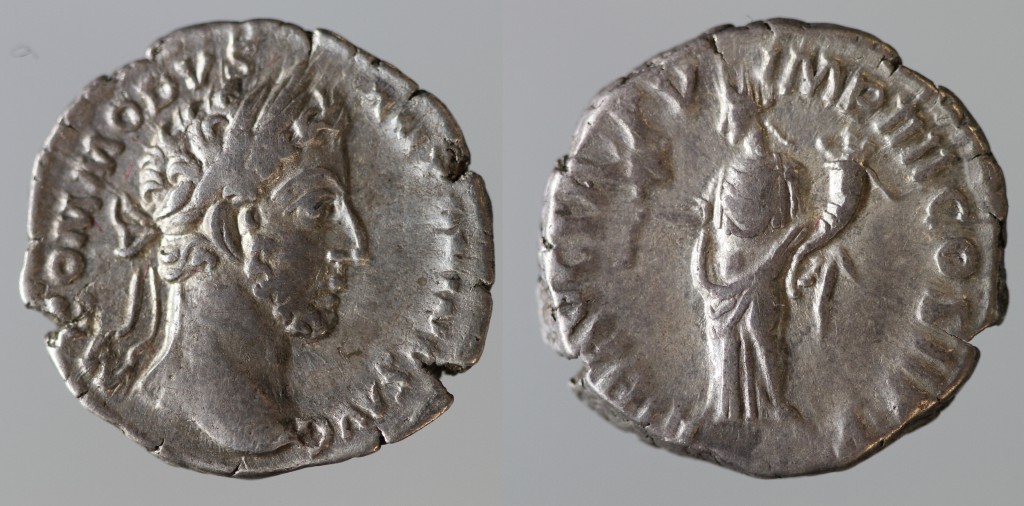December 31, 2015, by Will Leveritt
On this day in AD 192, the Roman emperor Commodus was murdered.
Text by Lauren Shelton
Image by Sarah Jordan
The emperor was strangled in his bath by Narcissus, a wrestler who was tasked with the deed by a small group of conspirators: the Praetorian Prefect, Aemilius Laetus; Commodus’ chamberlain, Eclectus; and Commodus’ mistress, Marcia. This was not the first time an attempt had been made on the emperor’s life and the reasons for this become clear when one looks at his reign.

AR denarius of Commodus. Obverse has laureate head r., M COMMODVS ANTONINVS AVG. Reverse has Liberalitas l. with counting-board and cornucopia, LIB AVG TR P V IMP IIII COS II P P. 17mm, 12 o’clock, 2.72g.
Commodus was born in 161, the son of the popular and highly respected emperor Marcus Aurelius and his wife Faustina the Younger. He was the first emperor to be ‘born in the purple’, that is, during the reign of his father.
Commodus became co-ruler with his father in 177, when he was only 15 years old. The ancient Greek historian Herodian states that during his final illness Marcus Aurelius became worried that his youthful and pleasure-seeking son might ignore public affairs and descend into debauchery once he became sole ruler.
Marcus’ fears proved well-founded. Soon after his father died in 180 Commodus discontinued his father’s war against the Germanic tribes on the Empire’s northern borders, instead coming to terms with them; Commodus returned Rome to indulge in the pleasures of the city.
He soon faced the first attempt on his life, in 182. The conspirators included his sister, Annia Lucilla, as well as several senators, including Ummidius Quadratus, with whom Lucilla was said to be having an affair. Different sources give different reasons for the conspiracy: Herodian suggests Lucilla, who had once been married to Marcus’ co-emperor Lucius Verus, became jealous of the marks of honour and the precedence enjoyed by Commodus’ wife, Crispina.
But the Historia Augusta suggests that it was anger at Commodus misrule which provided the impetus. He is said to have insulted senators, given them positions below their dignity, given the rule of the provinces over to his favourites, and on a personal level to have engaged in scandalous behaviour. Whatever the cause, the assassination was botched, and Commodus had many of the conspirators executed, including (at a later date) Lucilla herself, and it was after this that his rule seems to have become even more unstable.
Sources such as Cassius Dio indicate that, just as his father seems to have predicted, Commodus avoided the running of the empire on a day-to-day basis and instead delegated this to a string of favourites whom he made his chief ministers.
These men, whether freedmen like Saoterus and later, the powerful Cleander, or Praetorian Prefects like Perennis, would rise to power, manage affairs to their own benefit, and then be cut down and replaced either through intrigue at the imperial court, or by Commodus himself as a means to appease a particular group when their deeds became more widely known.
The emperor was instead concerned with pleasure and displaying his own physical prowess by fighting as a gladiator in the arena or against wild animals during the many lavish and expensive public games he organized. He was also devoted to chariot racing, as Dio tells us.
Commodus also alienated public opinion by having a wide range of extraordinary honours voted to him, including renaming the legions, the months of the year and even Rome itself after himself or the virtues he believed he possessed. He even referred to himself as a Roman Hercules.
His misrule extended to murdering many prominent men and courtiers for a variety of reasons, both for minor personal sleights (real or imagined), or on false charges of conspiracy which fed his paranoia. Indeed, it was Marcia’s discovery of her name, and those of Eclectus and Laetus, on a list of intended victims that moved them to have the emperor murdered on 31 December, 192, at the age of 31. With him died the Antonine dynasty.
After his death, Publius Helvius Pertinax, the city prefect, became emperor but the transition was not smooth, and the Empire quickly slipped into a civil war which persisted until Septimius Severus succeeded in eliminating his rivals and attaining the throne.
No comments yet, fill out a comment to be the first

Leave a Reply